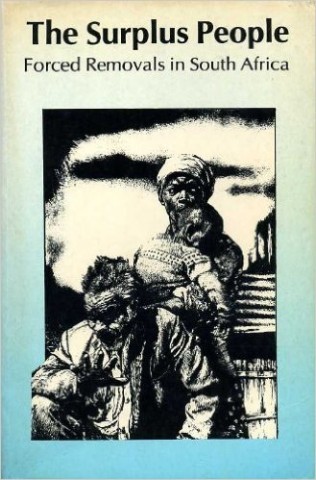Surplus People: Forced Removals in South Africa
The experts for this 'thought provoker' come from "The Surplus People: Forced Removals in South Africa" (1985) by Platzky and Walker, which is the summarized version of a five volume study on the topic. The book was published while apartheid was still forcing relocation and displacement, as one of its many policies for "separate development." In addition to its wealth of information, the book offers unique insight in that it is not a historical perspective, but one written at the time of the forced removals and was one of many important publications that drew greater levels of international attention to the atrocities being committed by the Apartheid government.
On apartheid:
- "The South African government claims that the only way to secure a peaceful future for all is for the different racial groups to development in their own areas. The policy of separate development is thus enforced by the white-elected government in every sphere of political, economic and social life. In reality it furthers privilege in each of these spheres for most whites at the expense of most blacks. Whites have been given 87% of the land area, free education and every opportunity, while blacks are permitted to leave their areas only to sell their labour on the white market." (p. 27)
- "After 1952 no African person was to be allowed to stay for longer than 72 hours in an urban area unless he or she had special permission to be there. This permission would be stamped in their passes for any policeman to inspect at any time, day or night. Those who did not have the correct stamps would be arrested. They could be imprisoned and fined." (p. 104)
- "More stringent controls were also placed on the presence of African women in the urban areas. Because of the position of women as the focus of family life, officials regarded them as a key index of how stable and permanent the urban African population was becoming. For this reason, they were anxious to limit their numbers in the urban areas and confine them to the bantustans as much as possible." (p. 117)
Why relocate?
- "Throughout the world people are moved to make way for infrastructural development such as building dams, highways or conservation areas, and for strategic purposes such as the clearing of border areas. South Africa is, however, exceptional in two respects. Firstly, the vast majority of people affected by these developments have no say in government – no vote and therefore no effective means of expressing their opinions in the matter. Secondly, because they are voteless they are not part of the interest group to benefit from developments such as improved water supply, transportation and national security. The removals are therefore forced and resented by the people." (p. 46)
- "Almost all of those who are moved in terms of government policy are black, disenfranchised and dispossessed. They are moved because they are black, by a minority government which has made the maintenance of white supremacy the cornerstone of its programme. They are moved from white areas to those proclaimed for blacks. The bantustan policy of the national government – basic to the system of apartheid – has developed largely as an attempt to appease militant demands from blacks for some control over their own lives and for a share of the wealth of the country. In place of rights in a common South Africa, it gives them 'homelands' where they are supposed to exercise political rights and build their own economies. Historically, as will be shown, apartheid has been the foundation for economic growth in serving the labour needs of the mining, agricultural and industrial sectors of the white economy." (p. 16)
- "As the years progressed, the function of the bantustans as enlarged relocation camps became more and more pronounced. As each new category of surplus people emerged or was called into being – labour tenants, unwanted farmworkers, the growing numbers of the urban unemployed – the dumping-ground function became progressively more important." (p. 123).
Featured Posts
Tags
Conflict
Africa
Ideology
Resilience
Human Rights
Inequality
Middle East
Civil society
Agriculture
Participation
Post-doc
decolonization
Interdisciplinary
South Africa
Culture
Rural Development
Racism
Revolution
Education
Books
Capitalism
Gender
Food Security
Fellowship
Migration
Poverty
Qatar
Development Studies
Sustainability
Colonization
Land
Institutions
History
Climate change
Democracy
Anthropology
Power
Governance
Ethnography
Colonialism
Development
Politics
Economics
Islam
Policy
Ethics
International development
Ethiopia
Leadership
Globalization

